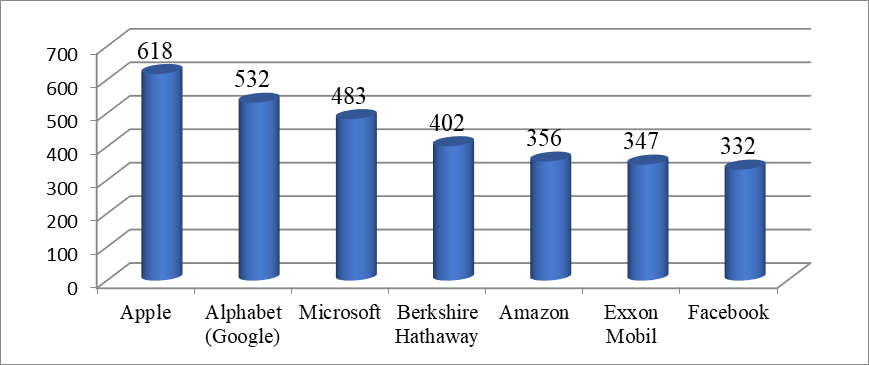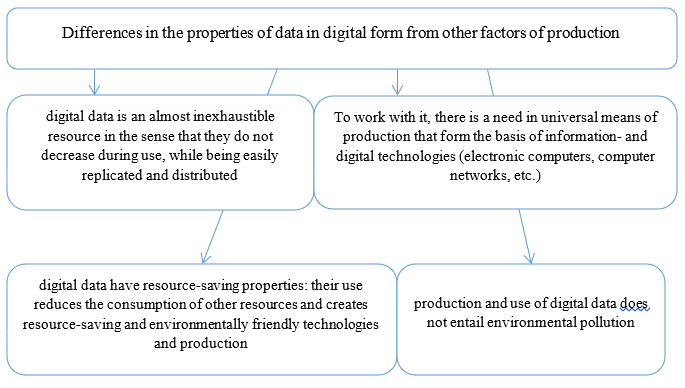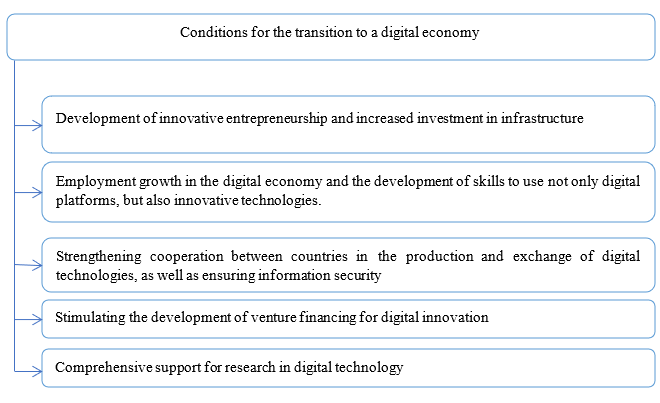Abstract
Currently, more and more attention is paid to issues related to the economy digitalization, which leads to socio-economic, political and financial prosperity. At the same time, a state with a decent level of socio-economic development has high competitiveness not only in the domestic, but also in the world market. The strategic priority in modern conditions of economic transformation, development and implementation of new information technologies in all economic spheres is the development of national programs which make the digitalization possible. The main aim of the work is to assess global trends in the digitalization processes, study the main elements that reflect this phenomenon, determine the global level of digitalization and assess the positions of states in the digital competitiveness ranking. The following tasks are solved in the article: to analyze current data on the dynamics of digitalization processes indicators in the global economic space. The methodological framework of the study is based on a systematic approach, as well as on methods of analysis and synthesis of theoretical insights and concepts introduces by leading Russian scientists in the field of digitalization assessment. This method uses indicators that reflect the state’s economic policy in this field. The article presents and analyzes relevant data on the dynamics of global trends in the digitalization processes. The author's assessment of current trends in the development of the Russian economy allows to understand the tasks that are associated with the transition to a qualitatively new level and are due to the requirements of digitalization.
Keywords: Digitalization of the economydigital technologyglobal ranking of digital competitiveness
Introduction
With the beginning of the new century, the issues of the economy digitalization are actively discussed in scientific and popular science publications, seminars and conferences are devoted to it. In recent years, several works on the introduction of digital technologies in various fields have been published, and numerous textbooks, monographs and study guides have been published. The problem of digitalization of the economy was developed in the works of such Russian and foreign scientists and economists as Berberov (2017). Khalin and Chernova (2018). No new ideas had been brought into this topic in the new century, but the attention of scientists was concentered on solving urgent and specific problems. Structural-logical models for ensuring economic and fiscal security that can be implemented using digital technologies are reflected in the works of Tkacheva and Afanasyeva (2016) and others. At the same time, in conditions of unpredictable processes occurring in the Russian economy, macroeconomic studies presented in the works of Belousova and other Russian economists are also of interest (as cited in Tsiklauri et al., 2017).
Interpretation of the category “digital economy” from a legal point of view in our country shows a description of the rules for its establishment. For example, the Strategy for the Development of the Information Society in the Russian Federation for 2017–2030 defines the digital economy as
Economic entities that actively use digital technologies in their activities, as a rule, are growth drivers and can provide a new economy with a digital resource. Although very recently (in the beginning of the 20th century), the main driving force of the world economy was oil refining, mining, iron and steel enterprises (Figure

In modern conditions of growing competitiveness and globalization, when all the extensive factors of the mankind development have been practically used, the contradictions in the development of all economies of the world have intensified. These circumstances contributed to the growing importance of digital data compared to traditional types of resources. Traditional technologies and production methods inevitably lead to the rapid consumption of all resources in the face of a deteriorating environmental situation. The best strategic way to reduce the negative environmental and economic effects is the discovery and widespread involvement of new factors of production in the world economy that contribute to the progressive development of modern economic processes (Hanna, 2018)
Resources that can be considered digital include big data in digital format, with properties that differ significantly from other factors of production (Figure

The economic policy of states in recent years is based on areas and areas of development of digital technologies, as digital data has become economic resources in all sectors and fields of activity that ensure economic growth through innovative technologies. Digitalization of the economy contributes to large-scale socio-economic transformations, increasing labor productivity, the emergence of new industries and jobs, as well as the emergence of new processes in state and corporate management (Kapranova, 2018).
Digital technologies fundamentally transform the structure of socio-economic and production systems. We single out the most essential conditions and requirements for the transition to digitalization strategies (Fig. 3).
The digital development of economic systems is showed by the annual increase in the share of the digital economy in world GDP by 18 %. The Boston Consulting Group predicts the digital economy to reach 16 trillion dollars by 2035.
The European Commission has published the development level of the digital economy, in which Russia lags in development from the countries of the European Union and the United States of America. The share of digital technologies in Russia's GDP is 4.1 % (Figure


The digital economy in the United States is shaped by the active investment of the private and public sectors in digital technology.
Table
In the Russian Federation, household expenditures in the digital sphere account for 2.6 % of GDP, which is about two times lower than that of developed countries, but nevertheless, it suggests a significant contribution to the development of new information technologies. The same trend is observed in the share of government spending and private investment in the structure of GDP. The negative is almost four times the excess of imports of digital technology in relation to exports. The scale of the investment programs of non-state companies in digital technologies in Russia is 2.2 % of GDP, compared with the United States, half as much (5 %), which indicates that medium and small businesses are not yet seeking to take advantage of information achievements.
The digitalization of the economy is primarily focused on increasing its efficiency and competitiveness. It is estimated that digitalization will reduce:
expenses for servicing production (by 10–40 %),
equipment downtime (30–50 %),
timing of market entry (20–50 %)
the costs of ensuring product quality (10–20 %),
expenses for storage of stocks (by 20–50 %), etc. (Lyapuntsova et al., 2018).
A fundamental factor in GDP growth in Russia is the digitalization of the economy, which will provide new markets, qualitatively new conditions for their functioning, breakthrough business models and technologies available to numerous participants in the global economic space (digital platforms, digital ecosystems, analytics of large data arrays).
The development of the digital economy in the USA and China has led to easier access to information and the creation of several other advantages for consumers and organizations of all sectors of the economy, lower prices, and the emergence of new competition factors.
Digital technologies make it possible to improve and improve the investment climate due to the transparency of business conditions, to create a business climate by increasing the availability and efficiency of public services.
Currently, there is an active formation of the main directions of the Russian Federation policy in the field of the digital economy, the implementation of large infrastructure projects allows the introduction of broadband, Internet, mobile communications, covering an increasing economic and geographical space.
Consider the world ranking of digital competitiveness (compiled annually by the Swiss International Institute for Management and Development in Lausanne) (Table
The digital economy is based on information and communication technologies, providing all stages of the reproduction process with model forms for electronic control. In this connection, they consider as constraining factors: the lack of modern technologies and digital infrastructure, the shortage of highly qualified personnel. Penetrating all spheres of social, socio-economic and state activities, digital technologies contribute to the formation of a new system for ensuring the economic security of the Russian Federation, which is manifested in new opportunities in combating money laundering, combating terrorism, and detailed economic relations.
Digitalization of the real sector of the economy makes it possible to increase the competitiveness of products and enter new high-tech markets, which will form the prerequisites for the sustainable development of the economy of the Russian Federation. Digitalization is a new basis for the development of the economy, public administration, business, the social sphere and the whole society.
Problem Statement
The following tasks are solved in the article: to analyze current data on the dynamics of digitalization processes indicators in the global economic space.
Research Questions
The subject is the process of introducing new information technologies in all spheres of economic activity, and the development of national programs conducive to the implementation of digitalization.
Purpose of the Study
The main aim of the work is to assess global trends in the digitalization processes, study the main elements that reflect this phenomenon, determine the global level of digitalization and assess the positions of states in the digital competitiveness ranking.
Research Methods
The methodological base of the study is based on a systematic approach, as well as methods of analysis and synthesis of theoretical developments and concepts of leading Russian scientists in the field of assessing the level of digitalization using indicators that reflect the state’s economic policy in this area.
Findings
The article presents and analyzes relevant data on the dynamics of global trends in the deployment of digitalization processes. An author's assessment of current trends in the development of the Russian economy allows us to understand the tasks that are associated with the transition to a qualitatively new level and are due to the requirements of digitalization.
Conclusion
The digital economy is based on information and communication technologies, providing all stages of the reproduction process with model forms for electronic control. In this connection, they consider as constraining factors: the lack of modern technologies and digital infrastructure, the shortage of highly qualified personnel. Penetrating all spheres of social, socio-economic and state activities, digital technologies contribute to the formation of a new system for ensuring the economic security of the Russian Federation, which is manifested in new opportunities in combating money laundering, combating terrorism, and detailed economic relations.
Digitalization of the real sector of the economy makes it possible to increase the competitiveness of products and enter new high-tech markets, which will form the prerequisites for the sustainable development of the economy of the Russian Federation. Digitalization is a new basis for the development of the economy, public administration, business, the social sphere and the whole society.
References
- Berberov, A. B. (2017). On the way to digitalization of the Russian economy: problems and prospects. UEKS, 7(101). https://cyberleninka.ru/article/n/na-puti-k-tsifrovizatsii-rossiyskoy-ekonomiki-problemy-i-perspektivy
- Hanna, N. (2018). A role for the state in the digital age. Journal of Innovation and Entrepreneurship, 7(1).
- Kapranova, L. D. (2018). Digital economy in Russia: state and development prospects Economics. Taxes. Law Int. Sci. and Pract. J., 11(2), 58–69.
- Khalin, V. G., & Chernova, G. V. (2018). Digitalization and its impact on the Russian economy and society: advantages, challenges, threats and risks. Management Consulting, 10(118). https://cyberleninka.ru/article/n/tsifrovizatsiya-i-ee-vliyanie-na-rossiyskuyu-ekonomiku-i-obschestvo-preimuschestva-vyzovy-ugrozy-i-riski
- Lee, I. (2017). The digital economy will increase Russia's GDP by 8.9 trillion rubles by 2025. RBC. http://www.rbc.ru/technology_and_media/05/07/2017/595cbefa9a7947374ff375 d4
- Lyapuntsova, E., Belozerova, Y., Drozdova, I., Afanas'ev, G., & Okunkova, E. (2018). Entrepreneurial Risks in the Realities of the Digital Economy 2018. MATEC Web of Conferences.
- Tkacheva, T. Yu., & Afanasyeva, L. V. (2016). Problems of the formation and development of the theory of the economic security. 3rd Int. Multidisciplinary Sci. Conf. on Social Sci. & Arts, SGEM-2016 Ser. Fiinance. Economic and tourism, 499–503.
- Tsiklauri, V. Yu., Devyatilova, A. I., Artemov, R. V., & Markina, S. A. (2017). Shadow globalization as a threat to world economic growth. Education Excellence and Innovation Management through Vision 2020 From Regional Development Sustainability to Global Economic Growth. Proc. of the 29th Int. Busin. Inform. Managem. Associat. Conf., 2478–2489.
Copyright information

This work is licensed under a Creative Commons Attribution-NonCommercial-NoDerivatives 4.0 International License.
About this article
Publication Date
31 October 2020
Article Doi
eBook ISBN
978-1-80296-091-4
Publisher
European Publisher
Volume
92
Print ISBN (optional)
-
Edition Number
1st Edition
Pages
1-3929
Subjects
Sociolinguistics, linguistics, semantics, discourse analysis, translation, interpretation
Cite this article as:
Afanasyeva, L. V., Tkacheva, T. Y., Belousova, S. N., & Markina, S. A. (2020). Digital Economy As A Factor Of Economic Growth. In D. K. Bataev (Ed.), Social and Cultural Transformations in the Context of Modern Globalism» Dedicated to the 80th Anniversary of Turkayev Hassan Vakhitovich, vol 92. European Proceedings of Social and Behavioural Sciences (pp. 9-16). European Publisher. https://doi.org/10.15405/epsbs.2020.10.05.2

